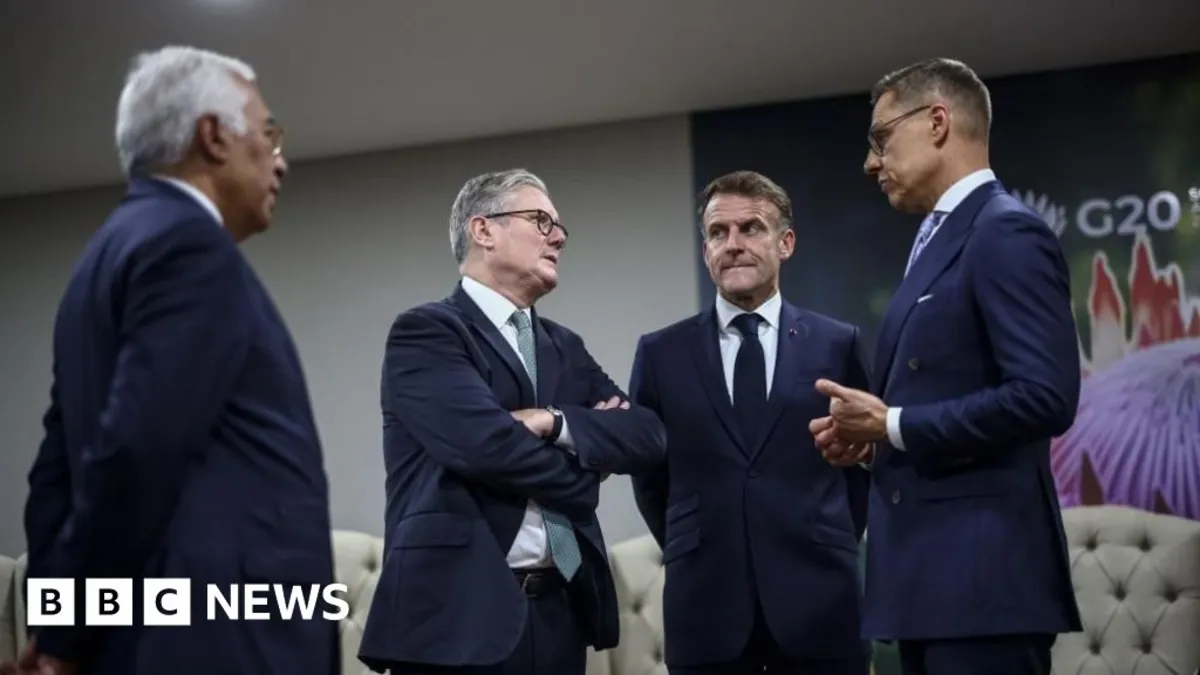
Ukraine's allies have expressed significant concerns regarding a recent US plan aimed at bringing an end to the ongoing Russia-Ukraine war. During a joint statement issued at the G20 summit held in South Africa, these allies highlighted that the draft proposals serve as a basis that necessitates further refinement. While the plan encompasses crucial elements that could contribute to a just and lasting peace, there are notable apprehensions concerning border adjustments and restrictions on Ukraine's armed forces.
In a poignant address, Ukrainian President Volodymyr Zelensky underscored the gravity of the situation, stating that Kyiv is currently facing one of the most challenging periods in its history. This warning comes amidst increasing pressure to accept the US plan, details of which have been leaked and perceived as more favorable to Moscow than to Ukraine. President Donald Trump has set a deadline of November 27 for Ukraine to accept the 28-point plan, which has sparked further unrest.
The statement from Ukraine's allies was co-signed by leaders from Canada, Finland, France, Ireland, Italy, Japan, the Netherlands, Spain, the UK, Germany, and Norway, along with two high-ranking officials from the European Union. The leaders emphasized their commitment to engaging in discussions to ensure that any future peace would be sustainable. They firmly stated the principle that borders must not be altered by force and raised concerns regarding proposed limitations on Ukraine's military, which could potentially leave the nation vulnerable to future aggression.
The widely circulated US peace plan suggests that Ukrainian forces withdraw from certain areas in the eastern Donetsk region, which are currently under their control. It also implies a de facto acknowledgment of Russian authority over the Donetsk and Luhansk regions, as well as the southern Crimea peninsula, annexed by Russia in 2014. Furthermore, the plan proposes freezing the borders of Ukraine's southern Kherson and Zaporizhzhia regions along existing battle lines, as both regions remain partially occupied by Russian forces.
In addition to border issues, the US draft outlines a limitation on Ukraine's military to a personnel cap of 600,000, with the prospect of European fighter jets stationed in neighboring Poland. Although the plan promises reliable security guarantees for Kyiv, specific details regarding these assurances have yet to be disclosed. The document also anticipates that Russia will refrain from invading neighboring countries and that NATO's expansion will halt.
Another contentious aspect of the proposal is its suggestion for Russia's reintegration into the global economy. This would involve lifting sanctions against Russia and potentially inviting the country to rejoin the G7, thus restoring its status as the G8. These elements raise questions about the long-term implications of the plan and its effect on the international community.
In light of the unfolding situation, President Zelensky has tasked his head of office, Andriy Yermak, with leading Ukraine's negotiating team. This decision comes as Kyiv remains heavily reliant on deliveries of advanced weaponry from the United States, including essential air defense systems to counteract Russian air assaults and critical intelligence support.
On the Russian side, President Vladimir Putin confirmed that Moscow had received the US plan, although he noted that it had not been thoroughly discussed with Kremlin officials. Putin expressed a willingness to demonstrate flexibility in negotiations while also preparing for continued military engagement. Since launching a full-scale invasion of Ukraine in February 2022, Russian forces have gradually made advances in Ukraine's southeastern regions, despite enduring significant combat losses.